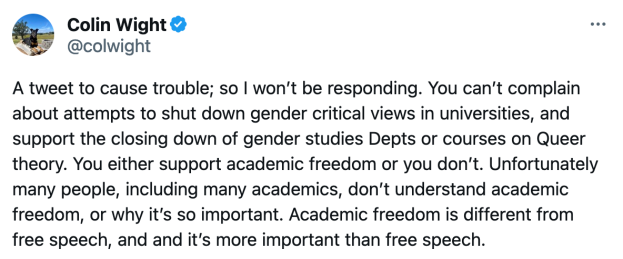
“Mathematics has been gatekept by the West and defined to exclude entire cultures” declares Professor Rowena Ball of the Australian National University, who wants mathematics to be “decolonised”. In one sense she is right, mathematics is indeed “a universal human phenomenon” that transcends individual cultures. But she is wrong to suppose that anyone disagrees; she is wrong to claim that there are people who think of mathematics as having “an exclusively European and British provenance” and want it to remain that way. Rebutting a strawman serves only to signal one’s superior attitudes.
Professor Ball claims that “Almost all mathematics that students have ever come across is European-based”, and yet “algebra” is an Arabic word and so is “algorithm”. Foundational concepts such as the number zero and negative numbers originated in the Middle East, India and China before being adopted by Europeans. The mathematics now taught to schoolchildren in Mumbai and Tokyo is the same as that taught in London.
Being Australian, Ball’s primary concern is to laud the mathematics of indigenous Australians as being of equivalent merit to globally mainstream mathematics, so she wants a “decolonised” curriculum in which “indigenous mathematics” has equal standing.
But how much substance is there to her case? What would actually be taught? Professor Ball’s article gives only one anecdote about signalling with smoke rings, and based on that alone concludes that: “Theory and mathematics in Mithaka society were systematised and taught intergenerationally”.
In a longer, co-authored article, she reviews evidence of mathematics among indigenous Australians prior to Western contact, but finds little beyond an awareness of counting numbers and an ability to divide 18 turtle eggs equally between 3 people. She recounts that they had concepts of North, South, East and West, could travel and trade over long distances, and knew about the relationship between lunar cycles and tides, and had an understanding of the seasons and the weather. And yes, I’m sure that they were indeed expert in the forms of practical knowledge needed to survive in their environment. But there is no indication of a parallel development of mathematics of equal standing to that elsewhere.
The two authors assert: “We also illustrate that mathematics produced by Indigenous People can contribute to the economic and technological development of our current ‘modern’ world”. But nowhere is that actually illustrated. There is no worked example. The suggestion is purely hypothetical. And there is no exposition of what a “decolonised” mathematics curriculum would actually look like.
There is one claim in the article that did seem intriguing:
But Deakin (2010, p. 236) has devised an infallible test for the existence of Indigenous mathematics! This is that there must be ‘an Aboriginal method of predicting eclipse’. To predict an eclipse, one needs clear and accurate understanding of the relationships between the motions of the Sun and Moon. In spite of the challenge, the answer is yes. Hamacher & Norris (2011) report a prediction by Aboriginal people of a solar eclipse that occurred on 22 November 1900, which was described in a letter dated in December 1899.
Predicting solar eclipses is indeed impressive. It requires considerable understanding and long-term record-keeping over many centuries, in order to discern patterns in eclipse occurrences, or it requires some sophisticated mathematics coupled with measuring and recording the locations of the sun and moon to good accuracy. Either is hard to do in a society lacking a written language. (English astronomer Edmond Halley is best known for having predicted the return of a comet and for predicting a solar eclipse over London in 1715, the first secure example of that feat, though it is likely that Babylonian, Chinese, Arabic or Greek astronomers, such as Thales, possibly using something like the Antikythera Mechanism, had done so centuries earlier.)

This geoglyph in the Ku-ring-gai Chase National Park has been interpreted as a record of a solar eclipse, depicting the eclipsed crescent above two figures.
Hence, Professor Ball’s claim of a successful prediction of a solar eclipse is vastly more significant than anything else in her paper. So I looked up the source, a paper by Hamacher & Norris (2011). The evidence is a letter written in December 1899 by a Western woman who says: “We are to witness an eclipse of the sun next month. Strange! all the natives know about it; how, we can’t imagine!”.
Afterwards the same correspondent wrote: “The eclipse came off, to the fear of many of the natives. It was a glorious afternoon; I used smoked glasses, but could see with the naked eye quite distinctly”. But there was no eclipse until a year after the first letter (Nov 1900), not “next month”; the “fear of many of the natives” is incongruous with the suggestion that they had predicted it; and the text of the letters comes from a later compilation in 1903. This is the only piece of evidence given that Aboriginal Australians had developed the ability to predict eclipses; Professor Ball presents nothing else, and nothing from Aboriginals themselves. She gives no account from any Aboriginal about how this is done, and if that’s because she cannot find anyone who could give that account, then doesn’t that count for more than one anecdote that could have been misunderstood or miscommunicated?
That Professor Ball accepts such weak evidence uncritically shows that she is driven by an agenda, not by a fair assessment of the development of mathematics or of the history of indigenous peoples. There is no substance here, no account of what an “indigenous mathematics” curriculum would look like. It does students from indigenous backgrounds no favours to divert then away from global mathematics into “ethnomathematics”. Ironically, it is people like Professor Ball who are telling them that mathematics is “colonised” and European and not for them. This is the wrong message. Mathematics and science are universal, and should be open to everyone, and we should not be dividing universal enterprises into silos with ethnic labels attached.
This piece was written for the Heterodox Academy STEM Substack and is repoduced here.






